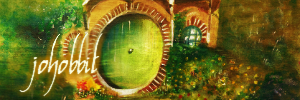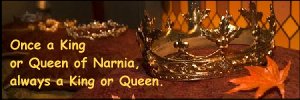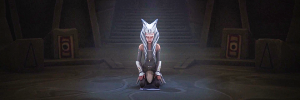I have often wondered where Tolkien got his idea for hobbits. I don’t know if any other medieval fairy tales have creatures exactly like hobbits, although there are creatures like dwarves and elves. The hobbits are probably something unique to Tolkien’s books. Lewis didn’t have them in Narnia, although he did have talking beasts and other creatures from mythology. Tolkien may have thought that his fictional creatures were actually real.
@narnian78 they were definitely his own creation (sub-creation), but there are similarities with 'little people' of many countries' lore.
Hobbits are similar to humans, and reflect many aspects of our lives before the industrial revolution.
There, shining in the sunrise, larger than they had seen him before, shaking his mane (for it had apparently grown again) stood Aslan himself.
"...when a willing victim who had committed no treachery was killed in a traitor's stead, the Table would crack and Death itself would start working backwards."
Oh yes. Hobbits being of Tolkien's origins makes them stand out. The rest are either humans or from other mythologies, like elves, dwarfs, orcs, ettins. It's like how in Narnia, the Marshwiggles are of CS Lewis's own creation.
Now back to Middle earth discussion, who knew that Tolkien could come up with hobbits?
"And this is the marvel of marvels, that he called me beloved."
(Emeth, The Last Battle)

Oh yes. Hobbits being of Tolkien's origins makes them stand out. The rest are either humans or from other mythologies, like elves, dwarfs, orcs, ettins
That last one is meant to be "Ents", I assume? I'm currently reading The Silmarillion and am starting to learn about how they came to be (in the "in-universe" sense, that is)! Tolkien was drawing on older mythologies for inspiration for those creatures and characters, of course, but even so, he makes them his own in his own way.
Hobbits definitely were entirely his own idea, though — I remember reading an interesting book years ago (I can't remember the title or author!) that speculated on how he might have come up with the term "hobbit", comparing it with the meanings of similar-sounding words like "hob", "hobble", "hobnail", "hobnob", "hobby", and so on. I'm not sure if there's any proof that he drew on those words and meanings consciously — this commentary didn't provide any evidence of that — but it certainly made the case that "hobbit" is an apt name!
As a bit of trivia, too, I also read somewhere that the use of the term "hobbit" is copyrighted to the Tolkien Estate, precisely because Tolkien himself invented the word. That's why similar characters in other fantasy stories, computer games etc. (little people about half the height of an ordinary human) are called "halflings" instead! Tolkien does use that word occasionally — I'm not sure whether or not he invented it — but it's not nearly as quirky and memorable as "hobbit".
"Now you are a lioness," said Aslan. "And now all Narnia will be renewed."
(Prince Caspian)
I always liked it when the Ents said “Let’s not be hasty”. It was an example of Tolkien’s clever wit and humor. If it takes people a long time to do things they are like the tree shepherds. 🙂
I should add I am finding The Silmarillion just breathtaking — I find I usually can't bring myself to read more than a few pages at a sitting, as it's so deep and gives one a lot to think about. I had read one or two "Tolkien companion" guides that explained the basics — who the Valar and the Maiar are and so on — but now at last I'm reading the actual stories of "how it all began" for Middle-earth... I definitely wouldn't have appreciated it properly back in my teens — when I first tried reading it and gave up in bewilderment — but I'm definitely ready for it now. (And the friend and fellow Tolkien fan who lent me The Silmarillion also has the Unfinished Tales and other such goodies on hand, so I'll have plenty more to be going on with. ![]() )
)
"Now you are a lioness," said Aslan. "And now all Narnia will be renewed."
(Prince Caspian)
I was given a beautiful hardcover edition of The Silmarillion many years ago, and it is one of the prettiest books that I own. I tried reading it several times but was baffled by the huge number of names and places. Reading it was like reading the genealogies in the Bible. But of course the names of people and places go on for chapters, and it may seem quite burdensome. It was remarkable that Tolkien created such a complex world, but I do wish he had made the book easier to understand. But as it is the book is something to admire. It is something to love just as the more difficult portions of the Bible are compelling mysteries. 🙂
I got the audiobook of The Silmarillion for my husband a year or two ago and he has added it to his audiobook rotation with Hobbit and LotR. I haven't read Sil in YEARS. I wonder if it would be easier to get through and understand if I listened to it over and over like he does. LOL
I really enjoyed it the time I read it. It's just an intimidating book to dive into.
I should add I am finding The Silmarillion just breathtaking — I find I usually can't bring myself to read more than a few pages at a sitting, as it's so deep and gives one a lot to think about. ... I definitely wouldn't have appreciated it properly back in my teens — when I first tried reading it and gave up in bewilderment — but I'm definitely ready for it now.
I'm totally with you here, Courtenay! I cannot read that book quickly. There is so much to digest. In fact, the second time I read The Sil, I started making charts of who's who (Men, Dwarves, Elves, Maiar, Valar) and family trees, etc. That was SUCH a help. But I wish I knew where I filed those sheets!! ![]()
I am so glad you are reading this epic book now. And I was the same as you ... the first time I tried it, I gave up. And indeed, @fantasia, it is intimidating, truly. I then waited about a decade before attempting again, with the encouragement of others. That time I couldn't get enough of the tales.
Your copy of The Silmarillion sounds beautiful, @narnian78!
Good for Tom for adding it in to his audiobook rotation, fantasia! Now, that is an idea for Christmas: the audiobook. Who reads the one Tom has?

Signature by Narnian_Badger, thanks! (2013)
7,237 posts from Forum 1.0
The copy of The Silmarillion I'm reading is a really lovely hardcover as well — in fact, it's a first edition with dustjacket in near pristine condition, as the friend who lent it to me bought it the day it was released back in 1977!! I've pointed out to him that it would be worth absolutely incredible money to some collectors and I feel like I should be handling it with white gloves, but he's not interested in things like that, just in the wonders of Tolkien's world itself... ![]()
"Now you are a lioness," said Aslan. "And now all Narnia will be renewed."
(Prince Caspian)
Um, actually ![]() , on the subject of the origins of the word hobbit: Tolkien did not invent it, although he definitely invented the way we think of them now. The word appears in The Denham Tracts, which were about folklore and published in the 1890s. Hobbits are included in a long list of fantastical creatures, including hobgoblins, leprechauns, and brownies. However, Tolkien certainly thought he invented the word, and it is not clear if he ever read the tracts.
, on the subject of the origins of the word hobbit: Tolkien did not invent it, although he definitely invented the way we think of them now. The word appears in The Denham Tracts, which were about folklore and published in the 1890s. Hobbits are included in a long list of fantastical creatures, including hobgoblins, leprechauns, and brownies. However, Tolkien certainly thought he invented the word, and it is not clear if he ever read the tracts.
I joined a local Tolkien book club and we're reading The Annotated Hobbit, and that was one of the more interesting notes. I thought he invented hobbits until I read it!
@dot Now that's interesting! The Wikipedia article on the Denham Tracts led me to this one on the word "hobbit" itself and possible origins for it — worth reading.
It seems it's unclear whether or not Tolkien ever read the Denham Tracts, or even if he did, whether he was consciously or unconsciously drawing the word "hobbit" from there. It's also noted that the context of the word "hobbits" in that piece is a single mention in a list of ghoulish and ghostly beings, implicitly unlike the kind of characters that Tolkien gave the name "hobbits" to. So it's all a bit of a mystery as to whether that text had any influence on him at all...
The Annotated Hobbit sounds fascinating — I'd love to read that too! I hadn't heard of it before.
"Now you are a lioness," said Aslan. "And now all Narnia will be renewed."
(Prince Caspian)
I remember reading somewhere that the Led Zeppelin song “The Battle of Evermore” on their fourth album has a connection with The Lord of the Rings. Perhaps Led Zeppelin was inspired by Tolkien. “Stairway to Heaven” kind of sounds that way too— it is such a beautiful song. It’s kind of odd that a rock album could have medieval connections, but they may indeed be there. I like that Led Zeppelin album the best of all their music.
The copy of The Silmarillion I'm reading is a really lovely hardcover as well — in fact, it's a first edition with dustjacket in near pristine condition, as the friend who lent it to me bought it the day it was released back in 1977!! I've pointed out to him that it would be worth absolutely incredible money to some collectors and I feel like I should be handling it with white gloves, but he's not interested in things like that, just in the wonders of Tolkien's world itself...

I'm afraid it might not be quite as valuable as that - the first edition of the Silmarillion was printed in quite a large number, so it's not as rare as many other first editions are. Possibly the publishers were expecting that the popularity of the book would be similar to that of LotR - and possibly it wasn't quite the same. I don't know whether there were versions both with and without dustjackets of the first editions, though. If so, the one with a dustjacket might be more rare - and a book in near pristine condition will be a lot more valuable than a battered copy.
I could have bought mine on that same day, too. I was at university in Exeter, England, at the time, and the University bookshop must have combined several tables to create a large area in the middle of the shop - all filled with copies of the Silmarillion. I guess there must have been a few hundred books on that table.
I was curious as to whether it would be very similar to LotR (which I had only read once by then, in Danish from a Norwegian library, and loved), so I picked up a copy and flicked through the beginning of it. It was so different from LotR that it didn't catch my interest - so I didn't buy it ...
It took a few years - and a few rereadings of LotR (which I got my own copy of during that time in England) - before I tried the Silmarillion again, and then I was better prepared for it.
Making a name list is useful. I found especially all the Fin-names confusing - and they are even close family: There is king Finwë, and his two youngest sons are Fingolfin (who has a son named Fingon) and Finarfin (who has a son named Finrod).
There are other siblings as well in this royal family, though. For one thing, Finrod's sister is Galadriel.
Glad to hear that you are reading it now!

(avi artwork by Henning Janssen)
My copy of The Silmarillion does have the dust jacket with a little wear on it. The book is still in very good shape and it’s still beautiful after 45 years. 🙂
I am now listening to the soundtrack of the 1977 cartoon movie of The Hobbit. It’s on old vinyl LP records and still sounds great after all these years (it’s from the 1970’s). Some people have criticized that movie, but I always have liked it. The animation was quite good and had a charm of its own, considering what was available at the time. In fact I think it was much better than the cartoon of The Lord of the Rings, which was made a few years later. I would say accept it for what it is— an old fashioned children’s cartoon which was made 45 years ago. There is no reason not to enjoy it if you don’t mind something that was made without modern technology. 🙂


